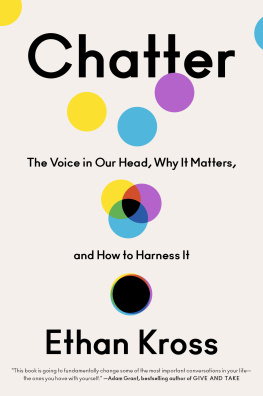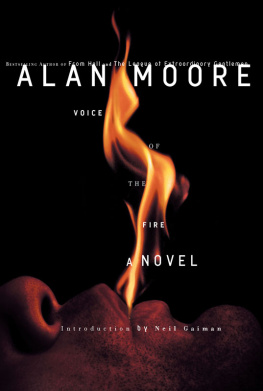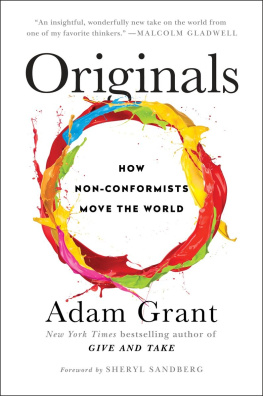
Ethan Kross
CHATTER.
The Voice in Our Head and How to Harness It

Contents
About the Author
Ethan Kross, PhD, is one of the worlds leading experts on controlling the conscious mind. An award-winning professor at the University of Michigan and Ross School of Business, he is the director of the Emotion & Self Control Laboratory. He has participated in policy discussion at the White House and has been interviewed about his work on CBS Evening News, Good Morning America, and NPR Morning Edition. His pioneering research has been featured in The New York Times, The New Yorker, The Wall Street Journal, USA Today, New England Journal of Medicine, and Science. He completed his BA at the University of Pennsylvania and his PhD at Columbia University. This is his first book.
To Dad, for teaching me to go inside,
and
Lara, Maya, and Dani, my ultimate chatter antidotes
The biggest challenge, I think, is always maintaining your moral compass. Those are the conversations Im having internally. Im measuring my actions against that inner voice that for me at least is audible, is active, it tells me where I think Im on track and where I think Im off track.
BARACK OBAMA
The voice in my head is an asshole.
DAN HARRIS
Introduction
I stood in the darkness of my living room, my knuckles white, my fingers tense around the sticky rubber handle of my Little League baseball bat, staring out the window into the night, trying desperately to protect my wife and newborn daughter from a madman I had never met. Any self-awareness about how this looked, or about what I might actually do if the madman appeared, had been washed away by the fear I was experiencing. The thoughts racing through my head kept repeating the same thing.
Its all my fault, I said to myself. I have a healthy, adorable new baby and wife upstairs who love me. Ive put them both at risk. What have I done? How am I going to fix this? These thoughts were like a horrible carnival ride I couldnt get off.
So there I was, trappednot just in my dark living room, but also in the nightmare of my own mind. Me, a scientist who directs a laboratory that specializes in the study of self-control, an expert on how to tame unrelenting negative thought spirals, staring out the window at three in the morning with a tiny baseball bat in my hands, tortured not by the boogeyman who sent me a deranged letter but by the boogeyman inside my head.
How did I get here?
The Letter and the Chatter
That day began like any other day.
I woke up early, got dressed, helped feed my daughter, changed her diaper, and quickly downed breakfast. Then I kissed my wife and headed out the door to drive to my office on the University of Michigans campus. It was a cold but tranquil, sunny day in the spring of 2011, a day that seemed to promise equally tranquil, sunny thoughts.
When I arrived at East Hall, the mammoth brick-covered building that houses the University of Michigans storied Psychology Department, I found something unusual in my mailbox. Sitting atop the stack of science journals that had been accumulating was an envelope hand addressed to me. Curious about what was insideit was rare that I received hand-addressed mail at workI opened the letter and began reading it as I walked toward my office. Thats when, before I even realized how hot I was, I felt a rush of sweat slide down my neck.
The letter was a threat. The first one I had ever received.
The previous week I had appeared briefly on CBS Evening News to talk about a neuroscience study that my colleagues and I had just published demonstrating that the links between physical and emotional pain were more similar than previous research had suggested. In fact, the brain registered emotional and physical pain in remarkably similar ways. Heartbreak, it turned out, was a physical reality.
My colleagues and I had been excited about the results yet didnt expect them to generate more than a handful of calls from science journalists looking to file a brief story. Much to our surprise, the findings went viral. One minute I was lecturing to undergraduates on the psychology of love, and the next I was receiving a crash course in media training in a television studio on campus. I managed to get through the interview without tripping on my words too many times, and a few hours later the segment on our work aireda scientists fifteen minutes of fame, which in fact amounted to about ninety seconds.
What exactly our research had done to offend the letter writer wasnt clear, but the violent drawings, hateful slurs, and disturbing messages that the text contained left little to my imagination about the persons feelings toward me while at the same time leaving much to my imagination about what form such malice could take. To make matters worse, the letter didnt come from a distant locale. A quick Google search of its post-mark revealed that it was sent from just a dozen miles away. My thoughts started spinning uncontrollably. In a cruel twist of fate, I was now the one experiencing emotional pain so intense it felt physical.
Later that day, after several conversations with university administrators, I found myself sitting in the local police station, anxiously awaiting my turn to speak to the officer in charge. Although the policeman I eventually shared my story with was kind, he wasnt particularly reassuring. He offered three pieces of advice: Call the phone company and make sure my home telephone number wasnt listed, keep an eye out for suspicious people hanging around my office, andmy personal favoritedrive home from work a different way each day to ensure that no one learned my routine. That was it. They were not deploying a special task force. I was on my own. It was not exactly the comforting response I had hoped to hear.
As I took a long, circuitous route home that day through Ann Arbors tree-lined streets, I tried to come up with a solution for how to deal with the situation. I thought to myself, Lets go over the facts. Do I need to worry? What do I need to do?
According to the police officer, and several other people I had shared my story with, there were clear ways I could answer these questions. No, you dont need to stress out over this. These things happen. There isnt anything else you can do. Its okay to be afraid. Just relax. Public figures receive empty threats all the time and nothing happens. This will blow over.
But that wasnt the conversation I had with myself. Instead, the despairing stream of thoughts running through my head amplified itself in an endless loop. What have I done? my inner voice shouted, before switching into my inner frenzy maker. Should I call the alarm company? Should I get a gun? Should we move? How quickly can I find a new job?
A version of this conversation repeated itself again and again in my mind over the next two days, and I was a nervous wreck as a result. I had no appetite, and I talked endlessly (and unproductively) about the threatening letter with my wife to the point that tension between us began to grow. I startled violently each time I heard the faintest peep escape from my daughters nursery, instantly assuming that the worst fate was upon her rather than a more obvious explanationa creaky crib, a gassy baby.
And I paced.
For two nights, while my wife and daughter slept peacefully in their beds, I stood watch downstairs in my pajamas with my Little League baseball bat in my hands, peeking out the living room window to make sure no one was approaching, with no plan for what I would do if I actually found someone lurking outside.
Next page












